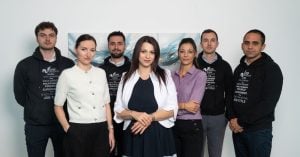Disinformation and the spread of fake news have been an ever-present constant during the past few years, no matter whether there is a political or economic crisis, a pandemic, or even a war.
During all of these major events, many have sought to use disinformation campaigns as their main assets, and even weaponizing them as the latest case of the war in Ukraine shows.
In such circumstances, disinformation can have harrowing effects on the population, experts point out. In many cases, the psychological effects of disinformation campaigns are more serious than the physical ones.
“Disinformation topics often seek to divide social groups by attempting to elicit emotional responses on an issue and by trying to ensure that people take extreme positions, reducing the likelihood of reaching consensus. Such narratives aim to confuse people and erode their trust in reputable sources of information and the democratic process in general,” information warfare expert Bilyana Lilly tells The Recursive.
To limit such harrowing effects, countries across the world have also sought to promote media literacy and enhance critical thinking as some of the most effective policies to address this challenge.
In the Baltics, Estonia was among the first victims of modern information and cyber warfare. In 2007, it suffered a massive cyberattack on most of its public institutions, amid a political conflict it had with Russia over relocating a Soviet-era statue in the capital of Tallinn.
As the three-week long cyber attack caused lots of damage to Estonia’s online infrastructure, it also prompted the country to start using media literacy as an antidote to disinformation and other types of cyber aggression.
Now, the young population in Estonia is taught media literacy from kindergarten all the way to high school. For Estonian students, the subject of media literacy is as important as mathematics, reading, and writing.
Nearby, authorities in Finland, another country frequently targeted by Russian disinformation campaigns, are also implementing various initiatives aimed at countering fake news and teaching its population how to withstand disinformation.
And Finland’s efforts have proved to be successful, as the country has been ranked first out of 35 countries in a study on resilience to fake news.
Media literacy education as a must for most Balkan countries
Contrary to Finland, Balkan countries such as Bulgaria and North Macedonia are either near, or at the very bottom of such lists. To improve the situation, individuals and organizations across the region have started initiatives aimed at introducing media literacy to the education systems in these countries.
The Media Literacy Coalition is one of those organizations, bringing together activists and professionals from the fields of education, journalism and civic participation in Bulgaria.
The Coalition’s main goal is to integrate media literacy fully into the educational process and to increase media literacy in the Bulgarian society, while also developing critical thinking in the digital media world for all age groups across the country.
According to Kristina Hristova, president of the Media Literacy Coalition, the biggest challenge for Bulgaria when it comes to media literacy is that authorities don’t have a unified approach towards the topic yet.
“This also hinders the development of media literacy skills through a holistic and comprehensive approach. For example, it entered school as a separate subject only three years ago, but even in its limited form, it is not clear what a media literacy class should include,” Hristova tells The Recursive.
“For us, the biggest challenge is to be able to implement media literacy in the education system as a set of skills that must be developed in each subject – information literacy, communication and cooperation, digital content creation, security and problem solving,” Kristina Hristova adds.
In that regard, the Coalition is now implementing several approaches. One of them includes preparing teachers on how to develop their students’ media literacy skills.
“We have a practical methodology, with ready-made lessons that are easy to apply regardless of the form of training – both online and offline. Our goal is to reach the children through the teachers while increasing the media literacy of the teachers themselves,” Hristova explains.
The Coalition also has training programs for the older population, which have proven to be particularly prone to disinformation.
“That is why our media literacy training program for older generations is especially important to us. So far, we are mainly developing it in the regional cities, and this year we are starting such training for the first time in Sofia. Our program includes:
- How to distinguish reliable from unreliable sources of information,
- How to recognize fake profiles on social networks,
- How to protect yourself from online fraud,
- And what are the risks associated with our personal data online,” Hristova adds.
In neighboring North Macedonia, media literacy is very much needed when it comes to countering various types of disinformation campaigns. A recent study found that nearly two-thirds of North Macedonia’s citizens were prone to many COVID-19 conspiracy theories and supporting unfounded claims.
According to digital and information literacy trainer Bojan Kordalov, there are always different reasons for disseminating such disinformation campaigns, as well as solutions for this issue.
“The interests for creating fake news are always different, and for their dissemination their creators seek to prey on people’s habits, different degree of trust in institutions, level of satisfaction from public services, level of awareness, education, information sensationalism, and so on,” Kordalov tells The Recursive.
To help prevent such phenomena in North Macedonia, there has to be an approach that focuses on prevention and raising public awareness about the effects of fake news.
“We need competent PR teams at the highest institutional level that will have an inclusive approach and will include everyone that has relevant knowledge about this issue,” Kordalov emphasizes.
Additionally, while digital transparency is a must, the country also needs to focus on creating an education system that will teach students how to develop skills for detecting and addressing such threats.








